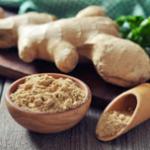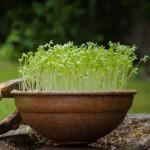.jpg)
11 Health Benefits of Cranberries and prunes
19.12.2016 | Wir alle kennen das! Wir wollen gut sein, uns gut ernähren und gesund bleiben. Aber trotz unserer besten Bemühungen gehen wir den Wirrungen und Aktivitäten des Alltags in die Falle - und der Hunger wartet nicht. So schieben wir uns zwischendurch hier ein Zimtbrötchen oder da einen Schokoladenkeks aus Erdnussbutter rein...um es dann den Rest des Tages zu bedauern. Von Vaidya Mishra. Article in English.

|
11 Health Benefits of Cranberries Cranberries are delicious when sweetened just right, but there are many more reasons we should eat them more often. You don't have to wait for the Fall, or Thanksgiving. With my new Cranberry Preserve, you can enjoy the health benefits of cranberries year round. Because they have so many health benefits. Here are a few: 1) Antioxidant powerhouse This disease-fighting fruit is one of the highest ranking,
regularly consumed foods for antioxidant content per serving, according to the Cranberry Marketing Committee. Antioxidants protect cells from the damage that oxidative stress and free radicals can have on them. That damage can lead to serious conditions like cancer and heart disease. Some of the antioxidants found in cranberries include anthocyanins, ellagic acid, quercetin, resveratrol, selenium, and vitamins A, C and E. 2) Rich Source of Phtyonutrients
3) Low-calorie flavor booster One cup of fresh cranberries contains 46 calories, according to the USDA. If you like them raw, they're a great low-calorie snack - but their tart flavor makes them an acquired taste. Use them in cooking and baking to add a pop of flavor while not adding a lot of calories, as in these recipes: 4) Urinary tract infection preventer Cranberries and cranberry juice have long been associated with preventing UTIs. There's a substance in cranberries that prevents "infection-causing bacteria from sticking to the urinary tract walls," according to WebMD. Study results, however, are very inconsistent. Some studies suggest that cranberries can lower the chance of repeated infections in young women. However, an October 2016 study published in the Journal of the American Medical Association found that female patients in nursing homes who took cranberry capsules for a year didn't have fewer episodes of UTIs than those who took placebos. 5) High in fiber One cup of cranberries contains 4.6 grams of dietary fiber. The Mayo Clinic says fiber maintains bowel health, lowers cholesterol, and helps control blood sugar. Foods high in fiber can also help control weight because they make you feel fuller for a longer period of time. 6) Full of Vitamins and Minerals One cup of cranberries contains 24 percent of the recommended daily value of vitamin C and 7 percent of the recommended daily values of vitamins K and E, according to Self Nutrition Data. It's also a good source of the mineral manganese, containing 20 percent of the recommended daily value. 7) Cardiovascular Disease Some evidence suggests that the polyphenols in cranberries may reduce the risk of cardiovascular disease (CVD) by preventing platelet build-up and reducing blood pressure via anti-inflammatory mechanisms. 8) Research on Cancer Research has shown that cranberries are beneficial in slowing tumor progression and have shown positive effects against prostate, liver, breast, ovarian, and colon cancers. 9) Supports Dental Health The same proanthocyanidins in cranberries that help prevent UTIs may also benefit oral health by preventing bacteria from binding to teeth, according to Researchers at the Center for Oral Biology and Eastman Department of Dentistry at the University of Rochester Medical Center. Cranberries may also be beneficial in preventing gum disease. 10) Ant-inflammatory Benefits For the cardiovascular system and for many parts of the digestive tract (including the mouth and gums, stomach, and colon) cranberry has been shown to provide important anti-inflammatory benefits. It's the phytonutrients in cranberry that are especially effective in lowering our risk of unwanted inflammation, and virtually all of the phytonutrient categories represented in cranberry are now known to play a role. These phytonutrient categories include proanthocyanidins (PACs), anthocyanins (the flavonoid pigments that give cranberries their amazing shades of red), flavonols like quercetin, and phenolic acid (like hydroxycinnamic acids). 11) Immune Support While research in this area is somewhat limited, recent studies on the immune support benefits of cranberry are exciting. In studies on very small numbers of human participants, intake of cranberry extracts has shown the ability to improve multiple aspects of immune function, and to lower the frequency of cold and flu symptoms in the subjects. In several of these studies, the cranberry extracts were standardized to contain a known, higher-end amount of proanthocyanidins (PACs)-somewhat comparable to a double-strength cranberry juice. |
|
Top 11 Benefits of Prunes 1) Helps Digestion Prunes are high in fiber, which helps prevent hemorrhoids brought on by constipation. Chronic constipation is a common problem in older adults and can be caused by pelvic floor dysfunction or the side effects of medication. It can also be a painful problem for infants. Prune juice acts as a laxative thanks to its high sorbitol content, so ask your doctor if it's right for you. A serving size of six prunes has 4 grams of dietary fiber, and one-half cup contains 6.2 grams. Women typically need 25 grams of fiber each day, while men need at least 30 grams 2) Aids Normal Body Functions Prunes are a good source of potassium, an electrolyte that assists in a variety of vital bodily functions. This mineral helps with digestion, heart rhythm, nerve impulses, and muscle contractions, as well as blood pressure. Since the body doesn't naturally produce potassium, consuming prunes or prune juice can help you avoid deficiencies. One half-cup of prunes contains 637 milligrams of potassium. This accounts for nearly 14 percent of your daily recommended need. Most adults should consume about 4,700 milligrams of potassium a day. Anemia occurs when the body doesn't have sufficient healthy red blood cells, which iron helps to make. Shortness of breath, irritability, and fatigue are all signs of mild anemia. Prune juice is a great source of iron and can help prevent and treat iron deficiency. One half-cup of prunes contains 0.81 milligrams of iron,while 1/2 cup of prune juice contains 3 milligrams. The average adult needs 10 milligrams a day, while menstruating or nursing women need 15 milligrams, and pregnant women need 30 milligrams. 4) Builds Bones and Muscles According to some studies, dried prunes are an important source of the mineral boron. Boron can help build strong bones and muscles. It may also help with improving mental acuity and muscle coordination. Prunes may be particularly beneficial to fighting the bone density loss that is a common side effect of radiation. A 2016 animal study has found that dried plums and dried plum powder can reduce radiation's effect on bone marrow, preventing bone density loss and promoting bone health. Prunes even have some potential as a treatment for osteoporosis. Another recent study presented evidence that dried plums can prevent bone mass loss in postmenopausal women who are prone to osteoporosis. Only 50 grams (or five to six prunes) a day were necessary to see benefits. 5) Reduces Plague Buildup Plaque buildup in the arteries causes atherosclerosis, a narrowing of the arteries, which can result in a shortage of oxygen and blood to the tissues of the body. If left untreated, this can lead to heart failure, stroke, and heart attack. Research suggests that dried prunes may help slow the development of atherosclerosis. Scientists have shown that eating prunes and drinking prune juice can significantly reduce blood pressure. Prunes can also be good for overall heart health. A 2010 study reported that blood pressure and hypertension were reduced in groups that were given prunes daily. This finding suggests that prunes can reduce hypertension and boost cardiovascular health. 6) Regulates food intake Dried plums can help you manage your weight by keeping you feeling full for longer. One study found that eating dried plums as a snack can suppress hunger for longer than a low-fat cookie. 7) Lowers risk of colon cancer Colon cancer is often hard to detect, but it can be aggressive. Diet can help prevent colon cancer, and research has shown that adding dried plums to your diet may reduce your risk. A recent study conducted by Texas A&M University and the University of North Carolina determined that eating dried plums can positively affect and increase microbiota (or beneficial bacteria) throughout the colon. This, in turn, can reduce the risk of colon cancer. 8) Prunes help to lower cholesterol The soluble fiber helps to lower cholesterol by soaking up excess bile in the intestine and then excreting it. Bile is made from cholesterol in the liver in order to digest fat. When the body excretes bile along with the fibre from prunes and plums, the liver must use cholesterol in the body to make more bile thereby lowering the amount in circulation in the body. Soluble fibre may also inhibit the amount of cholesterol manufactured by the liver in the first place. A 2011 study found that prunes are more effective than psyllium at relieving constipation. 9) A good source of vitamin K and beta carotene A 2013 study showed that an increased intake in beta carotene can actually make people happier. Beta-carotene also protects and fixes the damage of free radicals on our cells meaning it can help reverse the signs of aging. Vitamin K works in conjunction with beta carotene to fight the signs of aging by helping reduce bone loss and improving circulation. 10) Improves Vision Prunes are a great source of vitamin A, essential for healthy vision. Vitamin A deficiency is linked to night blindness, dry eyes, macular degeneration, and cataracts. 11) Aids in managing type 2 diabetes and obesity Prunes are high in soluble fiber that helps to keep blood sugar levels stable. Soluble fiber slows the rate that food leaves the stomach and, as a result, delays the absorption of sugar into the blood stream. Soluble fiber also increases the body's sensitivity to insulin. The soluble fiber in prunes helps you feel satisfied after a meal, which can prevent overeating and subsequent weight gain. |
Chandi LLC/ Vaidya R.K. Mishra
Chandi LLC/ Vaidya R.K. Mishra
9620 Topanga Canyon Place
91311 Chatsworth, California
USA
Kontaktperson:
Educator for Chandi LLC Vaidya Mishra
Telefon: 001 - 818 - 709 - 1005
Email: info@prana-center.com
Website: www.vaidyamishra.com
Dieser Artikel erschien am 18.11.2016 hier: https://www.svayurveda.com/sva-cranberry-preserve-plus-11-health-benefits-cranberries/ und hier: https://www.svayurveda.com/sva-prune-preserve-plus-11-health-benefits-prunes/ und wurde mit freundlicher Genehmigung von Vaidya Mishra im ayurveda-portal.de veröffentlicht.




.jpg)


.png)



